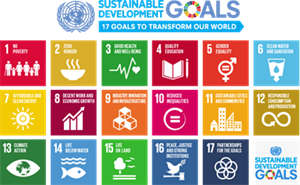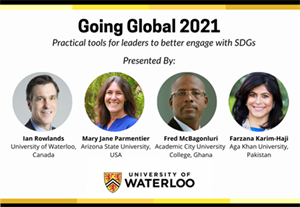Higher education institutions such as the University of Waterloo are filled with bright students learning skills to shape the world, researchers pushing the boundaries of current knowledge systems, and partnerships that catalyze collaboration and impact. This mix is a perfect ecosystem for developing knowledge and actions that promote positive social and environmental change.
The United Nations Sustainable Development Goals (SDGs) are 17 targets with 169 metrics that provide a framework for positive social and environmental change. The SDGs help organize, channel, and communicate the efforts made towards global development.

https://sdgs.un.org/goals
What roles can higher education institutions play in achieving the SDGs? Which institutions are leading the charge, and what tools can be learned from them?
On June 16th, 2021, four members of the Affordable Energy for Humanity consortium conducted a session at the 2021 Going Global conference run by the British Council, the world’s premier conference regarding innovation in higher education. Each speaker shared experiences from their home country and institutions, and suggested practical tools other institutions can implement to engage with the SDGs. Session speakers were:
- Mary Jane Parmentier, Clinical Professor and Chair, MS Global Technology and Development, Arizona State University, USA
- Fred McBagonluri, President and Provost, Academic City University College, Ghana
- Farzana Karim-Haji, Director of University Partnerships, Aga Khan University, Pakistan
- Ian Rowlands, Associate Vice-President International, University of Waterloo, Canada
Mary Jane Parmentier shared Arizona State University’s (ASU) success in being named the top US institution in achieving the SDGs by Times Higher Education, and some pathways that ASU used to receive that designation. With several multidisciplinary organizational units that focus on sustainable development, use-inspired research that focuses research to on-the-ground needs, partnerships with local municipalities, and the diffusion of SDG messaging, there is a lot to be learned from ASU’s work.
Fred McBagonluri shared Academic City University College’s (ACUC) focus on SDGs 4 – quality education, 9 – industry, innovation and infrastructure, 11 – sustainable cities, and 10 – reduced inequalities. ACUC’s curriculum has a large focus on ethical and developmental considerations of STEM (science, technology, engineering, and math), called ‘development engineering’, and Fred places a significant focus on the inclusion of women and girls in STEM education.
Farzana Karim-Haji shared the Aga Khan University’s (AKU) success in leveraging connections through the Aga Khan Development Network and beyond to develop robust local and global partnerships. Through international internship opportunities, both virtual and in-person, AKU has built partnerships and opportunities for students to take action on the SDGs. Farzana also shared the importance of being accountable and measuring impact regarding sustainable development.
Ian Rowlands shared three tools for building international partnerships for the SDGs: modular – starting small and getting early wins, hybrid – leveraging virtual interaction along with in-person, and empathy – understanding one another and using relationships of trust to build partnerships. Ian shared several examples from the Affordable Energy for Humanity consortium and from UWaterloo’s partnership with the University of Strathclyde in the UK.
This session through Going Global 2021 was a powerful example of SDG 17 – partnerships for the goals – and the Affordable Energy for Humanity consortium in action. WISE would like to thank Ian Rowlands for co-facilitating this session, all speakers for sharing their time and insights, and the British Council for organizing a stellar conference.
Read more about this session here: https://www.britishcouncil.org/going-global/practical-tools-better-engage-sdg
